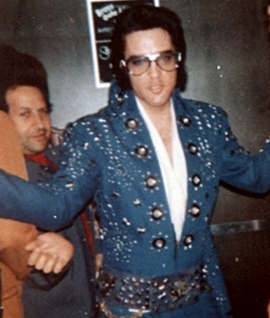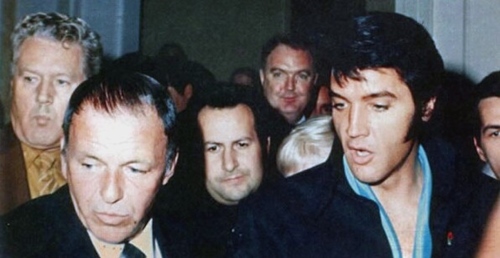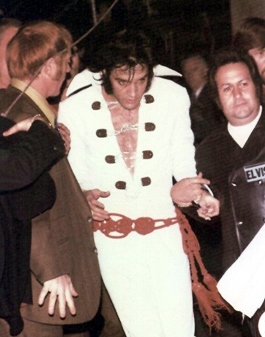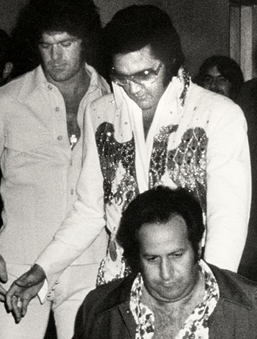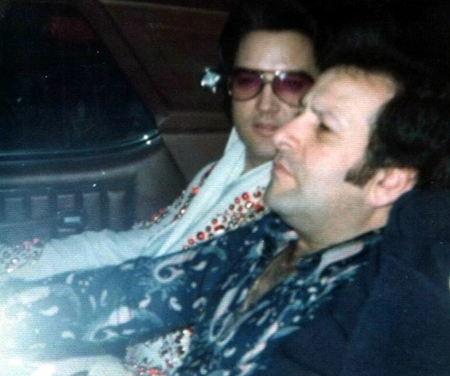 |
 |

EIN’s Nigel Patterson met Joe Esposito, twice in the one day, on a sunny afternoon at Waldorf Apartments, Canberra City in 2001. This was part of Mick Gerace’s ‘In The Spirit of Elvis’ tour in which Joe Esposito was doing a question and answer segment. Unfortunately EIN has lost the full original transcript of the 2001 interview – it is probably on a floppy-disc somewhere – but we did publish most of it in our EIN Fan Club printed newsletters. We remember asking Joe questions about working with John Denver and the Bee Gees and also what else he had been doing in the previous decade but that section is missing. The following is all we can find in our EIN archives of printed originals. Unfortunately at the time we never published it in full on the EIN website as one always believes you will meet up with these great characters from Elvis' life again in the near future.
Joe Esposito: The Frank Sinatra TV show. Elvis was just so nervous because he'd been away in the army almost 2 years. I remember how he was pacing back and forth in his dressing room and I remember him really sweating. He was so nervous. I think it was the first time he had ever met Sinatra and Frank had said some bad things about Elvis back when he started out. And Colonel Parker or Sinatra also wanted everyone to wear tuxedos so we all had to get fitted out by a tailor. Elvis really didn't know what to expect. In the end of course it all worked out great. Y' know it was the first time I had seen Elvis performing on stage to a live audience. Seeing that reaction, all the screaming and yellin’ for the first time, it was really exciting - for me. It was just great for me to be there and see it for the first time.
Vernon Presley, Frank Sinatra, Joe Esposito with Elvis in Las Vegas 1969
Q. Was it because of Frank Sinatra that you all got to be called the Memphis Mafia? Joe E: Yeah, like Frank Sinatra and the Rat Pack we were Elvis and the Memphis Mafia but there was never a rivalry thing. The name was given to us by a reporter - maybe in Vegas. We'd all be driving round there in limousines with black suits and sunglasses, white shirts looking like the mob. We thought it was funny. We all got a real kick out of it. Of course Sammy Davis was a good friend of Elvis' - and Elvis loved Dean Martin - so there was no rivalry. Q. The 60s movies were they good or bad for Elvis? Joe E: To begin with they were great. I remember the first day on the set of G.I. Blues, Elvis was so thrilled and excited to be back at the studio. Blue Hawaii was one of the best movies Elvis ever made and so much fun for everyone being in Hawaii. We stayed at Coco Palms on Kauai and every night we’d eat together and go sit and party in the bar. Patti Page (EIN Note: Best-selling female artist of the 1950s) was there because her husband Charlie O’Curran was the choreographer on Elvis’ movies. Elvis would sit around play guitar and sing songs - it was fun in those days. And then there was Ann-Margret and Viva Las Vegas, amazing chemistry between those two. But Elvis soon got tired, he wanted a serious role, he wished he didn’t have to sing in every movie. He wanted to do action movies, he wanted to be like Clint Eastwood, something like Dirty Harry. Elvis loved Clint Eastwood.
Q. What about Elvis and Ann-Margret? Joe E: I can tell you that Ann-Margret was his all-time favourite co-star and they were more than good friends for many years. She would call Graceland when he was there. And every time she had an opening show in Vegas Elvis always remembered to send her expensive flowers. Ann-Margret was Elvis’ only co-star that came to his funeral. Q. What about the idea for Elvis in ‘A Star is Born’? Joe E: I don't know what happened, there were a lot of meetings with Elvis and the Colonel. Streisand's boyfriend Jon Peters was going to direct the movie but it all never happened. Elvis could have done a good job in it - possibly better than Kris Kristofferson. Q. The Comeback Special and playing live in Vegas saved him from those terrible movies? Joe E: We all saw Elvis get excited again. He told the Col that was what he wanted to do. Elvis loved to be on stage more than anything else in the world. He wanted to go back to live performances in front of his fans. And that's what he did for the rest of his life, that’s what we did, and I was there at every concert.
Q: Joe, you are one of a select few who has worked as Tour Manager for two of the world's biggest superstars, Elvis and Michael Jackson. What was it like working with 'The King of Pop'? Joe E: Working with Michael Jackson was very different to working with Elvis. I didn't actually tour with Michael but I did the up-front arrangements. Michael's tour involved 18 months and there would have been a lot of time twiddling my thumbs in hotel rooms as Michael only performs three times a week. As my son had just been born, I asked if I could fly home every couple of weeks to be with my family but his policy was that no one left the tour. I think he was concerned that something might happen, they wouldn't return, leaving him with a problem. I didn't want to leave my family for long periods as I had done during my time with Elvis when my two daughters were growing up. Q: Your first book ‘Good Rockin' Tonight’ was a really interesting and positive tribute to Elvis. Have you any plans to re-release it? Joe E: Good Rockin' Tonight has been out of print for a few years now and I'm interested in re-issuing it in an expanded version. My original manuscript was 500 pages but Simon & Schuster released it as 250 pages. There are a lot more interesting things in the manuscript including things beyond Elvis's death in 1977. (EIN note: Joe Esposito published several books after we talked including ‘Remember Elvis’ and his ‘Elvis: Straight Up’ volumes)
Q. What do you think Elvis would be doing if he was still alive? Joe E: I think he might have got back in to the movie business. Maybe got a chance to do those action movies he loved. In his music I think he would have gone back to his roots and recorded more country and gospel songs. Y’know, Elvis sang gospel more than anything else when he was at Graceland playing the piano by himself. (EIN Note: Back in 2001 the “Elvis Is Alive” stories were far more active and headline-grabbing than they are now) Q. What about the ‘Elvis Is Alive’ stories and Gail Brewer-Georgio’s book? Joe E: If only. Everyone knows it was Elvis in the coffin whatever the stories and what people say. That woman is only in it for the money, it’s all fiction. I am surprised that Graceland don’t make a statement to counteract her stories. That phone-call tape she supposedly had.. the guy on the tape was really a guy named David Darlock and he admitted to me that it was a hoax. He said the same thing on TV ... on Geraldo I think it was. Q. Can I ask you about the stuff Dee Stanley has written about Elvis? Joe E: All those bad lies are coming from a very bitter and angry old woman. Elvis was always skeptical of Dee and that was why Elvis did not attend her wedding to Vernon. He was right. Those horrible claims about Elvis and Gladys… as well as Elvis being gay. I can tell you that Elvis loved women and that women loved Elvis! After everything that Elvis did for her three sons… I think Priscilla or someone should take Dee to court for defamation. Q. So what is your fondest memory of Elvis? Joe E: Best memory is Elvis looking at me with that big smile on his face. And also I remember him performing on stage when sometimes he would sing a song with such sincerity that it would bring tears to my eyes. I also knew that Elvis was always there for any of his close friends. To this day I feel bad that he's no longer with us. On the 2001 tour Joe Esposito talked openly about the final days with Elvis so we didn’t want to ask him all over again. However this is how he explained that fateful night to Larry King on CNN.
Joe E: Elvis got depressed a lot towards the latter couple years of his life. Because people don't realize when you're a big star, you turn 40 years old and at that time 40 was old. And there was a picture on a magazine, I forgot, it was 'Life' or 'Look' that said 'Happy Birthday Fat and 40 Elvis'. And that's a horrible thing to say about anybody. And that got to him. Little by little... You know, if you get depressed, you try to take something to make you feel happy, just like a person that drinks, they'd have a drink. Well, he'd take a pill. Elvis didn't eat good. He had an enlarged heart. He had high blood pressure. People didn't realize. And not only that, if you look at his family on his mother's side, they all died at very young ages. They were all addictive people. Couple of his cousins died from drug overdose and stuff, and his mother drank a lot. So, on his mother's side it was bad. He was on medication because he had glaucoma in one eye. He had some intestines problem. That's why a lot of his medication was off. But all that medication doesn't help because Elvis figured, you know, if one pill is ok, then take two pills must help better. But you know it doesn't work. He was, we were very close friends and we spent a lot of time together. And I consider him my best friend. And, so, when you lose somebody like that and all the time we spent together, our whole lives together, I thought my life had ended right there.
- Copyright Elvis Information Network 2016.EIN Website content © Copyright the Elvis Information Network.
Elvis Presley, Elvis and Graceland are trademarks of Elvis Presley Enterprises. The Elvis Information Network has been running since 1986 and is an EPE officially recognised Elvis fan club.
|
|





